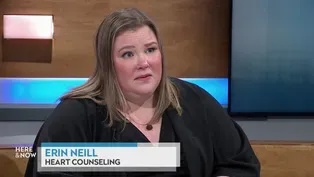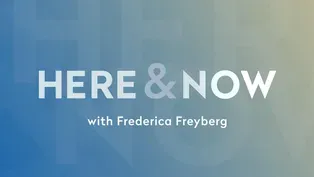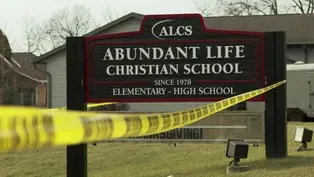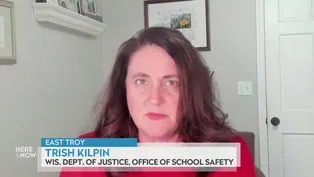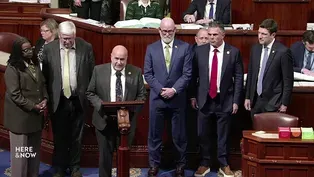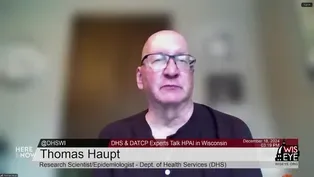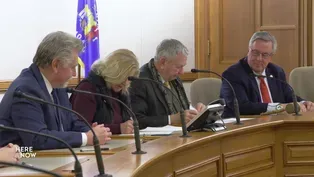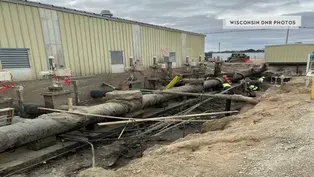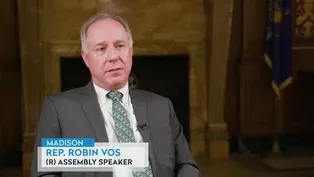Here and Now
Here & Now for December 20, 2024
Season 2300 Episode 2324 | 26m 48sVideo has Closed Captions
Watch the entire episode of Here & Now for December 20.
Watch the entire episode of Here & Now for December 20.
Problems with Closed Captions? Closed Captioning Feedback
Problems with Closed Captions? Closed Captioning Feedback
Here and Now is a local public television program presented by PBS Wisconsin
Here and Now
Here & Now for December 20, 2024
Season 2300 Episode 2324 | 26m 48sVideo has Closed Captions
Watch the entire episode of Here & Now for December 20.
Problems with Closed Captions? Closed Captioning Feedback
How to Watch Here and Now
Here and Now is available to stream on pbs.org and the free PBS App, available on iPhone, Apple TV, Android TV, Android smartphones, Amazon Fire TV, Amazon Fire Tablet, Roku, Samsung Smart TV, and Vizio.
Providing Support for PBS.org
Learn Moreabout PBS online sponsorshipThe following program is a PBS Wisconsin original production.
>> The truth is, today is a sad, sad day.
Not only for Madison, but for our entire country.
>> Tragedy strikes the state when a teenage student opens fire at a school.
>> How does any 15 year old get get Ahold of a gun?
>> One of many questions for police investigators.
[MUSIC] I'm Frederica Freyberg.
Tonight on "Here& Now", the small Christian school in Madison that became the scene of a mass shooting.
A trauma expert helps guide the way to healing.
The state Office of School Safety on its crisis response and prevention and assembly Speaker Robin Vos on continuing to fund that office.
[MUSIC] It's "Here& Now" for December 20th.
>> Funding for "Here& Now" is provided by the Focus Fund for Journalism and Friends of PBS Wisconsin.
>> Details continue to unfold following the devastating shooting inside a classroom at a Madison Christian school five days ago.
According to the AP, a man in California has been ordered by a court there to turn in his weapons and ammunition after interacting with the 15 year old shooter online about plotting a mass shooting with her in Madison, two members of the school community were shot to death, and the 15 year old took her own life, according to police.
The teacher killed was 42 year old Aaron Macheel West.
She was a substitute coordinator.
The student, who also died at the scene was 14 year old Ruby Patricia Vergara.
She was a freshman "Here& Now".
Reporter Aditi Debnath has more on the aftermath of the violence.
Reporter to a city mourned at a candlelight vigil outside the state Capitol.
>> Coming together following the shocking violence on Monday at Abundant Life Christian School in Madison.
That's when a teenage girl shot and killed a fellow student.
A teacher, and then herself inside the school.
I pray for you.
Jackson Ida went to the vigil to support his friends at Abundant Life.
>> It was just a whole range of like, worried ness and sadness and confusion.
>> Three dead, six wounded and hospitalized.
Two of the victims suffering grave injuries.
Executive director of the school system that manages abundant life.
Chuck Moore was at the vigil.
>> Please pray for the two that are still in the hospital.
It's life threatening and they may not survive.
>> Police are still piecing together what happened.
>> The first officers arrived at 11 a.m. And immediately went in the building.
>> After determining the shooter had taken her own life and transporting the injured to a hospital.
Police prioritized Reunifying students and teachers with their families.
Eight miles away, police served a search warrant at the shooter's family home looking for evidence.
>> They kind of all just swarmed right across the street to where it happened.
>> Police identified the shooter as Natalie Rupnow, a 15 year old student at Abundant Life.
>> We're a small, private Christian school here on the east side of Madison.
>> Barbara Wiers is an administrator at Abundant Life.
She shared details about the school's security measures, which include security cameras and regular lockdown drills.
>> When they heard lockdown, lockdown and nothing else, they knew it was real.
>> Abundant life has been closed since the shooting.
Neighbor McKenzie Truitt visited the school to add a poinsettia plant to a sidewalk memorial honoring the victims of the shooting.
>> My younger brother went there.
I have a lot of friends, family, friends that go there as well.
>> Truitt says her brother knows the victims personally.
>> It affects everybody.
I mean, when you go through a trauma like this, it's horrible.
Even if you weren't directly impacted, it still causes a lot of harm to you mentally.
Just knowing what other people are going through.
>> The rest of Madison schools stayed open, but some were placed on a brief, secure hold after receiving hoax threats.
The Madison School District superintendent told those gathered at the vigil that prevention of future school violence goes beyond physical security.
>> I think it'd be easy to say that we're going to work on safety, we're going to work on creating safe schools, and I don't think that goes far enough because we know what many of those things are.
What I plead to you tonight is that we find a new way, a deeper way, a more meaningful way to connect with our community, children to children, children to staff, families to families.
>> For Jackson Ida School safety is key to empowering youth and preventing violence.
>> I mean, the whole point of all of this is to be able to go and to get education so you can become the people who will hopefully be able to make this never happen again in the futur.
>> Reporting from Madison.
I'm Aditi Debnath for "Here& Now".
>> The concentric circles of trauma resulting from this week's shooting are most acute at the center for victims and Loved ones.
Then for the school community, the city, the region, and the state.
As people try to reconcile the horrible violence.
But how to do that?
Here to help Aaron Neill, a Madison psychotherapist specializing in trauma.
And thanks very much for being here.
me.
and loved ones of those killed experiencing right now?
And how do they ever move through that?
>> Yeah, I think it can be a little bit different for everyone.
Like you said, the people that are closest to it are going to have the most trouble right now.
I think just allowing all feelings.
Right.
Like there's probably grief loss for the loss of their friends and classmates.
There's confusion, anger, lots of lots of emotions, trauma wise.
You know, sometimes kids have nightmares.
They can like, kind of remember the scene that they saw if they were there.
And yeah, just also any experience they had, like having to leave the classroom quickly.
Right.
And all of that.
So just kind of kind of maybe reliving that, thinking about it more and maybe worrying about what happens next or, you know, going back to school eventually.
So, yeah, for sure.
>> So as to that school community, it's small.
>> It's really tight knit.
How does a group of people so close move through it themselves?
>> Yeah, I think actually that's an advantage for them.
Having that support of each other.
Right.
That they already are such a community.
They know each other.
They lean on each other.
So how do they move through it?
Like, yeah, being there for each other, having memorials, things that make meaning out of the tragedy.
And then the greater Madison community in Wisconsin, community also, Will wants to support them.
You know, and so figuring out how how to get that help to them too.
>> So there is this kind of collective heartache for all of us.
How are people to reconcile this in the midst of what should be a warm and loving holiday season?
>> That is a really good question.
Yeah, I mean, I don't know that there's a good answer for that right now.
I think, again, like I said, I want I hope that people can let themselves feel how they feel, grief.
As humans, we don't love to feel uncomfortable.
We don't love feeling grief, but it's okay to feel that right now and then.
Yeah, I think I see a lot of people really trying to figure out how do I make meaning, how do I honor the victims, how do I help the community?
You know, whether it's providing meals or church services, things like that that have happened and will continue.
>> How should parents talk about this with their children?
If at all?
>> I think you need to see where your child's at.
Obviously, parents should know their kids the best.
So I wouldn't I would say kids let kids lead the conversation.
Let them bring it up.
You know, check in with the, see how they're doing.
But yeah, I think in then notice.
Right.
Like, is there sleep different.
Are they eating different.
Are they, you know, is their play different for younger kids right.
Or teenagers.
More with when you notice that.
Ask them how are they doing.
You know and then explain things in a developmentally appropriate way.
Right.
Like it's also okay to share your feelings, right?
To say like this is scary.
This is confusing.
I do feel emotions, but parents need to keep control of their emotions too, right?
Because if you feel if you're out of control, if you're like sobbing and weeping and things, that's going to be hard for the kids.
They might feel like they have to take care of you.
So I think it's adults taking care of themselves as well, leaning on a partner or friends, and then sharing appropriate amounts of emotion with kids so that they can help share calm with kids too, and help them feel safe again.
>> How likely is it that the loss of a feeling of being safe at school, any school, touches families everywhere?
>> Yeah, I think that touches families everywhere.
I think you can see that when you're online and you know, I'm a parent, I have most of my friends are parents.
Like, we all this week then felt like, how do we drop our kids off at school the next day?
How do we.
Yeah, so I think it reaches everybody.
That feeling of are we safe?
>> What to do about that?
Anything.
>> It's tough.
Yes.
I think, you know, we have to, you know, contextualize it.
It is a random event.
And so that's hard to say.
Like this isn't going to happen here.
Right.
But it's unlikely that it's going to happen.
And we do things to keep ourselves safe.
We remind ourselves that we're safe in this moment.
You use things like grounding skills where you tap into your senses and say, okay, I'm here in this moment, I see, you know, a green tree, a green, you know, like kind of looking for things that are here in the present and knowing that you're safe here.
So, yeah.
>> All right.
Erin Neill, thanks very much.
Thanks for your help.
>> Thank you.
>> The Office of School Safety within the Wisconsin Department of Justice provides crisis response and recovery following a school shooting as part of its mission.
The office also operates a threat tip line.
Threat assessments and safety preparedness for schools.
Its director, Trish Kilpin, has been managing that crisis response in the minutes and days following the Abundant Life Christian School shooting.
She joins us now and thanks very much for being here.
>> Well, thank you for having me.
And highlighting school safety.
response look like?
>> Well, it's very comprehensiv.
We have built a coalition of folks across Wisconsin to be part of crisis response and recovery teams.
And so we had spent time last summer, in the summer before training folks, inviting them to an academy where I was able to lead them through some evidence based practices on how to help schools recover.
And so we were able to draw on those teams that we already developed, and they supported part of the reunification process for the school.
So that every child that was able to was reunited with their family.
And now we will be working to empower staff to meet the needs of children in ways that work, to get them back to learning.
Most effectively.
>> What is that like in the immediate aftermath of something like this?
When you go in and are literally hands on with these people who've experienced this?
>> It's heavy work.
It is.
It's heavy work.
And it's work that we I have a deep passion to make sure we get right.
We want to make sure that our efforts do no harm.
And really, you know, in, in the most horrible tragedies, there's not like one thing that we can say to make it all better for people, but we can hear them and listen to them and they can feel the love and the warmth from the community.
And so we've created with them, had them create opportunities for their community, their church community to gather and support each other.
And that's been really a beautiful process to see.
>> Your office also runs the Speak up, Speak out tip line, which I understand is taken thousands of calls in the in the past four years, including more than 400 that were potentially life saving in the last year.
Did anyone ever call about the 15 year old student at Abundant Life?
>> We don't have any tips pertaining to this.
Prior to the incident, so nothing that came through Souza about that individual.
>> So the police chief said in one of his briefings that this was a targeted shooting.
And you say targeted violence is preventable.
How so?
>> You know, when somebody decides that they're going to engage in a school shooting or an act of violence, they typically behave in ways that are observable to others.
And it's somewhat predictable.
Sadly.
They're in the process of unraveling as an individual and really, most school shooters show that signs in the months and days and weeks before the event where we see significant depression, agitation, mood swings, and then we see that they spend much time planning and preparing for this act, doing research.
And thats often observable to others.
More than 82% of the time.
Other students often know of a student's plan to attack.
So if people in the community see that somebody could be unraveling or they're seeing signs that somebody is thinking about school violence, they need to report that.
And, you know, we've had over 385 tips to Souza about this, about people planning school attacks.
And so we're able to get that to the local level and have it assessed to prevent that from happening, which, as we can see, the aftermath is so great.
We need to focus on prevention.
>> What is the primary driver for people who would commit this kind of violence?
Is it bullying online?
Is it kind of engaging in the darkest corners of the web?
>> That's a really good question.
So most school shooters do start with a grievance or an upset.
And then the individual often, you know, makes a decision and they progress down that pathway to violence.
But but newer research is really showing that it's often a shared belief system, what we call an overvalued belief system that they want to use violence to redress their problem or solve their grievance.
So it's not only about the bullying, you know, it is something that we need to be paying attention to.
And resolve early.
So nobody gets to that point of desperation.
But it's also about reshaping some of the thinking that they're, you know, we often see that they find other people who endorse their thinking, and then it grows and it's part of child development that, you know, people are not well versed at this, but it's also somebody who's thinking in a really dangerous way.
>> Meanwhile, the Office of School Safety is funded only through September in the aftermath of this shooting, it now seems, though, that Republican legislative leaders are inclined to fund your office.
What's your reaction to that?
>> Well, I'm not surprised.
Truthfully, that there's a growing commitment to making sure that we have funding to continue.
We need to be able to keep doing what works here in Wisconsin.
There have been many school violent incidents that have been averted, have been prevented, and we need every tool possible.
Schools deserve for, you know, to be able to count on our office, to know that our trainings are programed Souza is all going to be available to them.
And I just think it's very worrisome that we even consider stopping this funding, preventing us from moving forward and giving schools and communities and families what they need.
>> Trish Kilpin, thanks very much.
>> Thanks for having me.
>> Congressman Mark Pocan this week addressed the shooting at Abundant Life School, which is in his district from the floor of the U.S. House.
>> The Abundant Life community, the students, the staff, the parents are all victims of this traumatic experience.
And what happened this week will live on in our memories.
I urge all of my colleagues to think about what we can do to prevent us from having to stand here again for yet another moment of silence.
We must do better, and we must turn these moments of silence into moments of action.
>> As we sat down with Wisconsin Assembly Speaker Robin Vos for an end of year interview.
Senior political reporter Zac Schultz started by asking him about the Abundant Life shooting.
>> Mr. Speaker, let's start with the tragedy at Abundant Life.
This week.
Is there a legislative response that you a bill?
>> Well, first of all, my sympathies.
And what a heartbreaking situation.
It's just awful.
And one of the things that I always try to do in these situations is, first of all, wait for all the facts.
You know, I have news reports, I've read things, but I don't know what's real and what's not.
So first of all, I think that in a lot of these cases, it's almost impossible to think what could be done differently.
You know, me like far too often it's a troubled teen who perhaps was bullied or had issues at school.
And that's awful.
We've done some good things.
We have the Office of School Safety, which I support.
We certainly made it harder to get into a school by providing funding to harden the entrances.
And then lastly, we put more money into school based mental health.
I think those are good things.
I can't imagine we would, you know, we certainly wouldn't cut any of those programs.
I think we maybe could look at potentially increasing them, but just again, a tragedy, and I want to wait for all the facts before we make any final decisions regarding the office of School Safety.
>> In the last budget, the Department of Justice would have that there wasn't the full amount that they requested to be funded, especially for the tip line.
And Governor Evers stepped in with some federal Covid funding.
Do you expect to fully fund that?
The tip line this time around?
>> I mean, I'm open to looking at all the details again, I don't know.
I mean, first of all, it has to work its way through the process.
I haven't seen all the budget submissions yet.
That has to go through.
Governor Evers first.
So I'm certainly open to looking at it.
I want to do things that are going to make a difference.
You know, I think the worst thing we can do is try to politicize these things or make some kind of an ideological lens.
If there are things that really will make a difference, of course, we're going to support those, but to just say we did something and then have it either not work or go in the wrong direction.
I also want to be careful about doing that too.
you.
You did lose some members, but you maintained a majority.
But is the new makeup of the legislature.
What does that mean for you?
Going forward?
Well, I think the reality is close majorities mean usually less happens.
belief that somehow if it's close, majorities, more is going to happen.
I mean, look at the Congress.
The closer the majorities, whether it's Democrats in charge or Republicans, it doesn't really matter.
It just makes it harder to get consensus.
Now, the good news for Assembly Republicans is that for 20 years, we've operated on a consensus model where most of the time we argue and debate and cajole until we get to a consensus, do the same thing.
I think there's a lot of that I'm excited to work on.
If there are some of those can be And I hope all of them can be.
But I also am not going to sacrifice our principles simply because the election had a change.
>> Democrats seem to think that they're going to have more say or more input.
This session.
It's coming up to your last question.
Your last answer to that.
What what role do they have to play as opposed traditionally, where it was that they wanted to sign on?
They could, but they really didn't legislation.
to be similar.
I would say this, that the freshmen who are coming in are clearly far left, right, many of them ran in districts as unabashed liberals, which they have every right to.
Well, we're Senate right conservatives.
So if there are areas we can find common ground and consensus, we are going to be all ears.
But the idea that we're somehow would have or done, a policy that we wouldn't have supported before, absolutely not.
You know, it's just not going to happen.
So I hope we can find consensus.
We did last time.
I mean, with big, strong majorities, we did, you know, shared revenue package.
The Brewers deal alcohol literacy, can do those again.
>> What are you expecting from budget proposal?
budget different than we've done before.
What happened last time is, of course, Governor Evers submitted it.
We threw it out.
We did our own budget.
We put in reductions in taxes and spending increases.
We had the biggest increase in a generation for schools, funding for, you know, nursing homes, all kinds of good things.
And the problem was he took almost all the spending increases and vetoed almost all the tax reductions.
So the reason that we have the surplus, more than half of it is literally the fact that tax cuts got vetoed and that money is now sitting in Wisconsin's treasury.
We're not going to spend that on growing government.
So what we're going to do is we're going to pass our tax cuts first.
We're going to actually find out how much money we have left over.
And then that's what we're going to invest in.
Government.
We're not going to do it in reverse where we spend on all the things that he wants, and then we don't get the tax reductions that Wisconsinites >> When, when do you expect to have those negotiations with the governor on what what he will sign as opposed to what he might veto?
I mean, I'm happy to do it at any time.
>> I mean, as you know, during December, we had a caucus last week.
You know, we're still kind of finding consensus.
We have to elect our leadership.
The Democrats just had their caucus.
So we're kind of finding our own consensus.
First, I feel pretty good about where Assembly Republicans are now.
We have to work with our Senate colleagues to make sure that they're in a similar place.
And then we'll sit down with the governor in January.
But I just want to be really up front about it that, you know, we're going to have a different budget process.
We are not going to have it where we spend a bunch of money, grow the size of government, hoping for tax cuts, and then, you know, like Charlie Brown and the the last minute and then we're stuck just with the spending increases and no reductions in revenues.
time.
Thanks very much.
>> Also this week, Wisconsin's ten electoral votes were officially cast for Donald Trump to be the next president of the United States.
>> The nominated presidential electors from the Republican Party of Wisconsin are the duly appointed presidential electors for the state of Wisconsin, electors for the Republican Party met at the Capitol and invited the media to witness them sign off on the formal documents that will be submitted to Congress and officially counted on January 6th of next year.
>> This comes four years after the Republican electors met in secret at the Capitol and signed off on fake documents.
Three lawyers for the Trump campaign then attempted to pass those false electoral votes to then vice President Mike pence.
Those three, including Wisconsin Attorney Jim Troupis, are now charged with 11 counts of forgery for their roles in the scheme.
Troupis and the other lawyers have a preliminary hearing in the case scheduled for January 28th.
Also this wee, Wisconsin confirmed its first human case of bird flu in Barron County.
The person who tested positive is a farm worker and one of 19 people exposed to the poultry flock.
There, where avian flu was detected.
State health officials say the worker came down with influenza like symptoms.
>> Those people who are exposed, we tell them very distinctly if they have any kind of symptoms of at all, and it has to be broad symptoms, very broad symptoms, you know, not anything that would indicate something that's very severe.
We would like to have those people teste.
>> The flock in Barron County was destroyed to prevent the spread of the virus in environmental news, nearly 70,000 gallons of oil spilled from a pipeline in Jefferson County.
It started leaking more than a month ago.
Canadian company Enbridge operates the pipeline and says the spill, quote, involved a faulty connection on a pump transfer pipe within the Enbridge Cambridge station, which has been repaired.
Investigation and remediation began immediately upon discovery and continues removal of impacted soils is continuing.
We estimate roughly 60% of the volume has been recovered so far.
This spill was discovered the same week the Wisconsin DNR issued initial permits for the controversial line five.
That's the Enbridge pipeline reroute around Bad River tribal land in northern Wisconsin.
Environmental advocate Toni Wilkin Gibart says the DNR's reasoning for approving line five defies common sense.
>> In Jefferson County, the spill happened.
For an extended period of time without the spill being detected, and that happened at Enbridge's own facility.
So the idea that Enbridge will with any reliability, be able to detect a leak across a 40 mile segment through pristine wilderness in northern Wisconsin is highly, highly questionable.
>> For more on this and other issues facing Wisconsin, visit our website at PBS Wisconsin.
Org and then click on the news tab.
That's our program for tonight.
I'm Frederica Freyberg.
We're off next week for the holidays, but we'll be back the following week for our first program of 2025.
[MUSIC] >> Funding for Here and Now is provided by the Focus Fund for
Erin Neill on the emotional impacts of experiencing violence
Video has Closed Captions
Erin Neill on traumas experienced by survivors and families following violent acts. (5m 13s)
Here & Now opening for December 20, 2024
Video has Closed Captions
The introduction to the December 20, 2024 episode of Here & Now. (1m 8s)
Madison Confronts the Enormity of the Abundant Life Shooting
Video has Closed Captions
Educators and the Madison community grapple directly with an epidemic of violence. (4m 17s)
Trish Kilpin on responding to and averting school shootings
Video has Closed Captions
Trish Kilpin on the crisis response following the Abundant Life Christian School shooting. (6m 10s)
US Rep. Mark Pocan responds to the Madison school shooting
Video has Closed Captions
U.S. Rep. Mark Pocan comments on the Abundant Christian Life School shooting in Madison. (38s)
Wisconsin detects a human bird flu case in Barron County
Video has Closed Captions
A human case of bird flu was detected in a worker at a poultry farm in Barron County. (46s)
Wisconsin's 2024 electors cast ballots for Trump
Video has Closed Captions
Wisconsin's 2024 presidential electors cast their votes for Donald Trump. (1m 9s)
Environmentalists Cite Enbridge Line 6 Leak in Line 5 Debate
Video has Closed Captions
Environmental groups point to an oil spill in Jefferson County for Enbridge Line 6. (1m 32s)
Speaker Robin Vos on Wisconsin Politics Going Into 2025
Video has Closed Captions
Robin Vos on leading the Republican caucus and its 2025-27 state budget priorities. (5m 13s)
Providing Support for PBS.org
Learn Moreabout PBS online sponsorshipHere and Now is a local public television program presented by PBS Wisconsin
